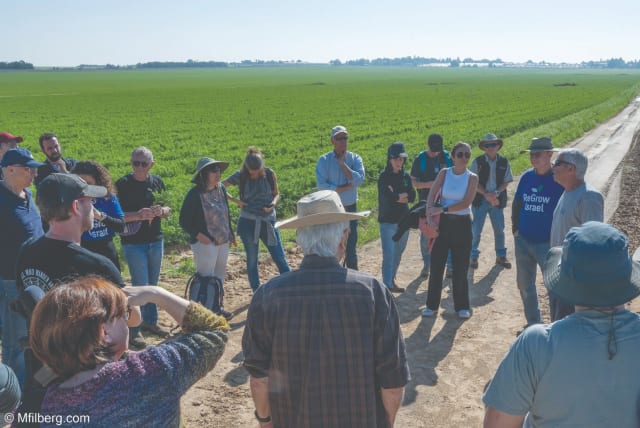Crisis as a catalyst, will Oct. 7 reshape the Israeli tech ecosystem? - opinion

Israel's tech ecosystem responds innovatively to crises, transitioning from emergency hacks to long-term recovery solutions, fostering national growth opportunities.
When Israel needed water in the desert, we created pioneering irrigation technologies. When faced with non-conventional threats, we became a cyber empire. In the wake of the October 7 tragedy, Israel is still facing a whole new host of problems. These challenges, though new to Israelis, are too familiar to many countries that experience natural and man-made disasters. Sadly, these disasters are growing in frequency and severity.
The awful experience that October 7 forced upon us can break us or lead to the development of the most powerful impact-tech ecosystem the world has ever seen, changing the trajectory of this space forever. This will not be an easy opportunity to seize, but we believe that we must go all in – it will serve our recovery process, it’s an opportunity to play a role in addressing global challenges, and it offers an incredible economic engine if we do it right. Disasters are not going away, but our innovative response can turn adversity into opportunity.
Much has been written about Israel as the Start-up Nation, the blossoming, Middle Eastern tech miracle where there are more start-ups per capita than anywhere else on the planet.
Israel’s tech ecosystem unsurprisingly focuses on sectors such as cyber, fintech, and enterprise solutions; and with good reason. The ecosystem grew under the influence of foreign tech leaders and venture capitalists with backgrounds in corporates, the military, and finance, and was fueled by innovation from the IDF. This influence has paved the way for Israeli founders to focus on problems affecting companies and institutions in the US and Western societies – a sensible approach given the financial opportunities in these areas and the first-hand experience of the ecosystem veterans who were able to mentor, fund, and support entrepreneurs working on problems they knew.
OCTOBER 7 and subsequent events have thrust all Israelis into uncharted territory. Despite struggling with disbelief and contending with a government that is untrusted and not functioning ideally, Israelis and their allies around the world have responded with what we believe will be remembered in history as one of the best community responses to a disaster. CEOs became philanthropists, conference spaces became donation centers, volunteers were organized to replace workers drafted into reserve service, and a jaw-dropping amount of donations was collected.
Unsurprisingly – we also witnessed an extraordinary surge in ad hoc ‘emergency’ hacks. New tech solutions were developed to identify and track people in distress, provide rapid response documentation solutions in field conditions, leverage CRMs for data management of displaced individuals, utilize AI to identify missing and kidnapped people, and more.
As Israel transitions from emergency response to recovery, we are starting to see a similar innovative spirit in addressing long-term recovery issues.
Innovating recovery
One example is Citizen AI – a fintech start-up that leverages its financial education platform to help individuals and organizations understand their rights and navigate the complex benefits system. Utilization of rights and financial health is not a new problem in Israel (nor around the world), but now, the flood of people in need and the new programs are driving focus and clarity to what is required.
In the agriculture sector, programs such as ReGrow Israel are not only focused on building what was destroyed, but are also seizing the opportunity to build a more advanced, tech-enabled, and resilient agricultural ecosystem. These programs have the potential to not only strengthen the food system that sustains the country and supports the livelihoods of families of farmers and other businesses on the value chain – but also to provide critical insights and learning to fuel AgTech companies.
We are seeing a surge in innovation in the physical and mental health space. With so many individuals working to recover and integrate back into society and the dozens of people surrounding them, in a place like Israel, this can only mean one thing: more ground-breaking ideas and solutions.
One example is the Lev Hasharon Mental Health Center where cutting-edge technologies such as VR are integrated into the care plans of mental health patients, in departments such as hospitalization, daycare, and specialized clinics for sexual trauma and child-and-youth mental support. Patient feedback has been exceptionally positive, with about 70% reporting significant reduction in anxiety and stress levels.
All these programs and ideas were not born in a vacuum. They were bred and incubated through an incredible impact-tech ecosystem that already exists in Israel. However, they are the minority, underfunded, and under-supported, and this must change. As these sectors are growing globally and creating more demand – now is the time to double down on these opportunities.
This can be a defining moment or a grossly missed opportunity for Israel’s Tech Ecosystem and its national economy. We must take this terrible disaster and the challenges it forced us to experience – and do what we do best. Solve. Innovate. Build. And scale for the greater good and the benefit of all.
For this to happen, everyone needs to play a role; there is a lot of work to do. We need to close knowledge gaps about new markets, fund experimentation, and bring together people who are not used to collaborating with each other, such as social workers, engineers, NGO leaders, investors, nurses, and salespeople – we need them all to bring multidisciplinary knowledge and experience to the table.
We built PollyLabs to bridge the tech gap and exponentially accelerate solutions to the world’s most pressing needs. Like everyone, October 7 threw us all into a stark place, both personally and professionally. It also brought into sharp focus the tremendous opportunity for Israel to build and heal itself and others like never before. Let’s take on this role; we were made for this.
Bar Pereg is the CEO of PollyLabs. Alina Shkolnikov is the chief partnership officer at PollyLabs and a board member of the Devorah Forum.
Jerusalem Post Store
`; document.getElementById("linkPremium").innerHTML = cont; var divWithLink = document.getElementById("premium-link"); if (divWithLink !== null && divWithLink !== 'undefined') { divWithLink.style.border = "solid 1px #cb0f3e"; divWithLink.style.textAlign = "center"; divWithLink.style.marginBottom = "15px"; divWithLink.style.marginTop = "15px"; divWithLink.style.width = "100%"; divWithLink.style.backgroundColor = "#122952"; divWithLink.style.color = "#ffffff"; divWithLink.style.lineHeight = "1.5"; } } (function (v, i) { });

